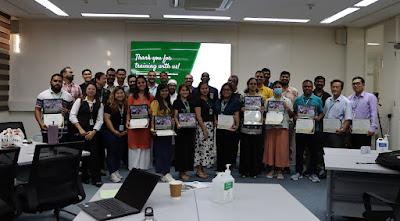The Transformative Policies and Investments (TPI) Unit of the International Rice Research Institute (IRRI) held a strategic planning workshop and retreat to review accomplishments, identify areas for improvement, and develop recommendations for future initiatives.
Friday, December 20, 2024
Monday, December 16, 2024
Workshop highlights innovative fertilizers for sustainable rice production in Vietnam
Hanoi, Vietnam, 3 December 2024 - The Ministry of Agriculture and Rural Development -Plant Protection Department (MARD-PPD), in collaboration with the International Rice Research Institute (IRRI), conducted a workshop on Innovative Fertilizers and Microbial-Inoculants for Better Soil Health. Various representatives from MARD agencies, academic institutions, the private sector, international organizations, and other stakeholders, particularly from the Mekong River Delta and Red River Delta, joined the workshop to discuss how to improve rice quality, reduce carbon emissions, and increase the economic value of rice, rice straw, and carbon credits through innovative fertilizers.
Wednesday, December 11, 2024
JAIF Supports CLV Researchers through Training in Genomic Prediction and Biotic Stress Resistance Evaluation
Rice cultivation challenges continue to threaten the agrifood sector, especially in developing countries. In response, the International Rice Research Institute (IRRI) conducted training programs designed to enhance the skills of researchers, focused on genomic prediction in crop breeding and biotic stress resistance evaluation, which will empower them to apply advanced breeding tools and standardized methods to develop resilient rice varieties and address critical agricultural challenges in their respective countries.
Tuesday, December 10, 2024
2024 OneRicePH Crop Tour: Understanding rice lines and varieties performances and production challenges across multiple sites in the Philippines
The DA-BAR funded OneRicePH Project conducted a series of site monitoring visits or “crop tours” of the wet season trials and techno-demos from September to November 2024.
2024 RDA-IRRI agricultural technology cooperation meeting emphasizes joint research and collaboration for healthier, climate-smart rice
On November 25, 2024, the International Rice Research Institute (IRRI) hosted the biennial meeting for agricultural technology cooperation between the institute and Korea’s Rural Development Administration (RDA). Dr. Dong-Jin Shin, RDA scientist seconded to IRRI in 2024-2025, stated that the meeting was intended to review the progress of ongoing projects and discuss additional opportunities for potential cooperation.
Monday, December 2, 2024
Sustainable and inclusive canal water management in coastal Bangladesh emphasized in workshop
SHATKHIRA, Bangladesh, 02 December 2024: Freshwater resources in salt-prone deltaic regions like Bangladesh are becoming increasingly unreliable due to climate change and other anthropogenic drivers, leading to declining agricultural productivity and heightened vulnerability among coastal communities. In response to this growing crisis, a sub-national workshop entitled “Inclusive Canal Water Management in Coastal Bangladesh: Challenges and Potential for Resilient Agri-Food Systems” was held at the Shyamnagar Upazila complex in Satkhira on 28th November 2024.






